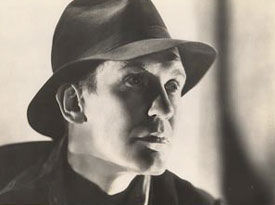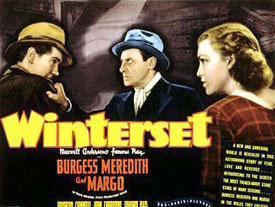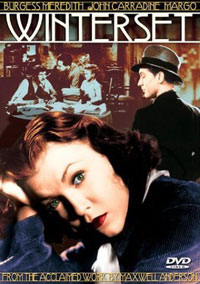 Bartolomeo Romagna (John Carradine) was a saintly union organizer framed in 1920 for the murder of a paymaster & given the death sentence, leaving behind a wife (Helen Jerome Eddy) & son. In 1936, the case is studied in a law class, & the man's execution is back in the news as a miscarriage of justice.
Bartolomeo Romagna (John Carradine) was a saintly union organizer framed in 1920 for the murder of a paymaster & given the death sentence, leaving behind a wife (Helen Jerome Eddy) & son. In 1936, the case is studied in a law class, & the man's execution is back in the news as a miscarriage of justice.
The executed man's son is now grown. Mio Romagna is played by Burgess Meredith in his first film, performing the role brilliantly after having been Mio in the original Broadway stage production of the play, now a recognized classic, by Maxwell Anderson.
Mio lives as a wandering tramp of the Depression era, always searching for the actual killer, a well-known gangster, Trock Estrella (Edwardo Ciannelli), himself only recently out of prison.
J. Peverell Marley's cinematography for Winterset (1936) is often thrilling, & received the Venice Film Festival Award. Marley was one of only six cinematographers given a star on the Hollywood Walk of Fame.
For Winterset, images of ghetto streets have a harsh impressionistic impact on the senses. The whole film has a proletarian perspective, with a willingness to look right into the face of poverty & injustice in ways the vast majority of films from the era almost pathologically refused to do, finding escapism easier to market than anguish. This is a true precursor to film noir.
Soup lines, street entertainers, & tramps on nameless ghetto streets...everything rises to heights of of grim beauty -- a smart & unpresuming script reenacted on doomful sets.
Miriamne (one-name actress "Margo") lives at the end of an alley in an oppressive basement apartment. It is here Mio finds her, with romantic developments, though his purpose was to find her brother Garth (Paul Guilfoyle), a gangster who was present at the murder blamed on Mio's father.
 I just adored Margo's acting & voice & face; she made Miriamne a wonderful character. And the instant affection she felt for Mio is moving & convincing, the one bit of light in a very dark melodrama. As she loves her brother, but cares also for Mio, she is terrified for two men. I just adored Margo's acting & voice & face; she made Miriamne a wonderful character. And the instant affection she felt for Mio is moving & convincing, the one bit of light in a very dark melodrama. As she loves her brother, but cares also for Mio, she is terrified for two men.
Judge Gaunt (Edward Ellis) who condemned the innocent man came to doubt the court findings. He became so haunted by guilt, he eventually lost his mind, & took to wandering homelessly, in search of the executed man's ruined family.
The primary villain, tubercular Trock, is relentless in his bile & appalling nature, a man without a soul. He murdered fellow gangster Shadow (Stanley Ridges) & intends to track down & kill everyone who might be able to pin the old murder on him. If paranoia hadn't ruled him, he'd never have been found out.
A shocking climax involves a gamut of emotion, intense horror, mixing love, hate, vengeance, murder, with a brother's redemption & sundry heroic acts. It is perhaps stretched out to an absurd length, but the point is so much deeper than a swift to-the-point climax that the meandering unfolding of little complexities is worthwhile.
The original play had very political underpinnings, as the tale was based on the actual trial of union radicals (Nicolo Sacco & Bartolomeo Vanzetti), tried & condemned to death in 1921 largely on the basis of the widespread hatred for "wops" as Italian immigrant laborers were called, with Judge Webster Thayer an unrepentent bigot & a jury of northern Yankees about as bad. A scene in Winterset when the doomed Bartolomeo Romagna denounces the judge in the courtroom was based on an eloquent letter written by Bartolomeo Vanzetti from Death Row.
When the actual killers became known, a special commission headed by the president of Harvard College performed a shocking white-wash that left innocent men to go into the electric chair. They were posthumously pardoned by governor Michael Dukakis in 1977 on the fiftieth anniversary of their state-sanctioned murder.
If Winterset has never been recognized for its poetic excesses & gothicisms & unique beauty, then what a shame that meaningful cinema really is a harder sell than trivial cinema.
copyright © by Paghat the Ratgirl
|

